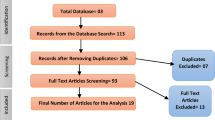Abstract
We examined the potential for epidemiological studies of mental disorders, specifically of posttraumatic stress disorder (PTSD), to cause further harm to participants involved. Of 1,000 randomly selected Australian Vietnam veterans, 641 agreed to participate in an epidemiological survey. Participants were asked about distress experienced during the interview when traumatic events were raised. Significant distress attributed to the interview was reported by 75.3% of those with current PTSD, 56.5% of those with past PTSD, and 20.6% of those with no PTSD diagnosis. Distress did not affect participants' use of medical services following the interview nor did it affect their willingness to continue participating in the study. We concluded that research interviews about PTSD may cause short-term distress, but found no evidence of long-term harm.
Similar content being viewed by others
References
Gidron, Y., Peri, T., Connolly, J. F., & Shalev, A. Y. (1996). Written disclosure in posttraumatic stress disorder: Is it beneficial for the patient? Journal of Nervous and Mental Disease, 184, 505–507.
Grayson, D. A., O'Toole, B. I., Marshall, R. P., Schureck, R. J., Dobson, M., Ffrench, M., Pulvertaft, B., & Meldrum, L. (1996). Interviewer effects on epidemiological diagnoses of posttraumatic stress disorder. American Journal of Epidemiology, 144, 589–597.
Greenberg, M. A.,& Stone, A. A. (1992). Emotional disclosure about traumas and its relation to health: Effects of previous disclosure and trauma severity. Journal of Personality and Social Psychology, 63, 75–84.
Henderson, A. S., & Jorm, A. F. (1990). Do mental health surveys disturb? Psychological Medicine, 20, 721–724.
Jacomb, P. A., Jorm, A. F., Rodgers, B., Korten, A. E., Henderson, A. S., & Christensen, H. (1999). Emotional response of participants to a mental health survey. Social Psychiatry and Psychiatric Epidemiology, 34, 80–84.
Jorm, A. F., Henderson, A. S., Scott, R., Mackinnon, A. J., Korten, A. E., & Christensen, H. (1994). Do mental health surveys disturb? Further evidence. Psychological Medicine, 24, 233–237.
Kelly, A. E., Coenen, M. E., & Johnston, B. L. (1995). Confidants' feedback and traumatic life events. Journal of Traumatic Stress, 8, 161–169.
Kolb, L. C. (1989). Chronic posttraumatic stress disorder: Implications of recent epidemiological and neuropsychological studies. Psychological Medicine, 19, 821–824.
McFarlane, A. C. (1989). The treatment of posttraumatic stress disorder. British Journal of Medical Psychology, 62, 81–90.
O'Toole, B. I., Marshall, R. P., Grayson, D. A., Schureck, R. J., Dobson, M., Ffrench, M., Pulvertaft, B., Meldrum, L., Bolton, J., & Vennard, J. (1996a). The Australian Vietnam Veterans Health Study: I. Study design and response bias. International Journal of Epidemiology, 25, 307–318.
O'Toole, B. I., Marshall, R. P., Grayson, D. A., Schureck, R. J., Dobson, M., Ffrench, M., Pulvertaft, B., Meldrum, L., Bolton, J., & Vennard, J. (1996b). The Australian Vietnam Veterans Health Study: II. Self-reported health of veterans compared with the Australian population. International Journal of Epidemiology, 25, 319–330.
O'Toole, B. I., Marshall, R. P., Grayson, D. A., Schureck, R. J., Dobson, M., Ffrench, M., Pulvertaft, B., Meldrum, L., Bolton, J., & Vennard, J. (1996c). The Australian Vietnam Veterans Health Study: III. Psychological health of Australian Vietnam veterans and its relationship to combat. International Journal of Epidemiology, 25, 331–340.
Pennebaker, J.W., & Susman, J. R. (1988). Disclosure of traumas and psychosomatic processes. Social Science and Medicine, 26, 327–332.
Scurfield, R. M. (1993). Posttraumatic stress disorder in Vietnam veterans. In J. P. Wilson & B. Raphael (Eds.), International Handbook of Traumatic Stress Syndromes (pp. 285–295). New York: Plenum Press.
Spitzer, R., Williams, J., & Gibbon, M. (1987). Structured Clinical Interview for DSM-III-R, version NP-V. New York: New York State Psychiatric Institute, Biometrics Research Department.
Author information
Authors and Affiliations
About this article
Cite this article
Parslow, R.A., Jorm, A.F., O'Toole, B.I. et al. Distress Experienced by Participants During an Epidemiological Survey of Posttraumatic Stress Disorder. J Trauma Stress 13, 465–471 (2000). https://doi.org/10.1023/A:1007785308422
Issue Date:
DOI: https://doi.org/10.1023/A:1007785308422




